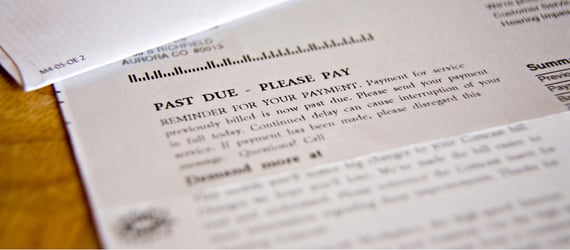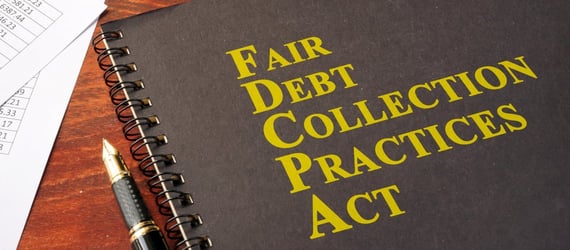

All is well when a credit card, loan, or bill is in good standing. The companies get what they want — the money — when they expect it, and you don’t experience any negative repercussions for falling behind on the payment.
Unfortunately, sometimes financial problems occur, and accounts descend into bad standing. That’s when trouble begins.
Here’s what happens when a debt is sent to collections — and what you can do beforehand to prevent it and afterward to fix it.
The Original Creditor Is Out. The Collection Agency Is In.
There are two basic types of creditors and each has an explicit agreement. The first is a lender, such as a credit card issuer or a bank.
The lender provides you with the money, and you repay what you borrow according to the terms of the contract.
If you don’t make your payment by the due date, most lenders will impose a late fee. If you still don’t pay, this is what lenders will do:
- Credit report damage: When you are a full billing cycle behind, the lender will furnish the credit reporting agencies — TransUnion, Experian, and Equifax — with data that shows you are delinquent. This makes the account officially in default.
- Internal collections. If you continue not to pay, the lender may route the account to its own collections division. That means the debt remains with the original creditor, but you’ll be dealing with a different department.
- Lawsuit. Lenders have the right to take you to court for an unpaid debt. Whether they will depends on several factors, including company policy and the amount owed. If the debt is small, taking you to court may not be worth the trouble, but suing you may make sense if it’s a large sum.
- Sell the account to a collector. This is the most common method of handling an outstanding account. The creditor sells the debt to a third-party company for a fraction of what the account is worth. At that stage, you no longer owe any money to the original creditor: You now owe the collection agency.
The other type of creditor isn’t a company you borrowed money from, but from which you received a service, such as a doctor, hospital, or utility company. These creditors don’t report to the credit reporting agencies, whether you’re paying on time or not.
However, if you don’t pay the bill, these businesses can exercise the same options as lenders: sue you for the amount owed or sell the debt to a collector. As with the lender, if the service provider sells the account, it’s now the property of the collector.
There is some gray area, though. Original creditors can also hire debt collectors to do the dirty work of making demanding phone calls and sending out letters. If you pay up, the debt collectors will send the money to the original creditor, minus their fee, which is usually between 25% to 50% of the amount collected.
How Debt Collection Works
When your debt is with a separate collection agency that purchased the account, you are dealing with a third-party company that has a singular purpose: to motivate you to pay the entire balance.

Debt collectors buy your debt from your original creditor then repeatedly contact you, possibly for several years, for payment. You may be able to settle for less than what you owe.
Collection agencies buy debt for less than their full value. The more collectible the account may be, the more the agency will pay for it. Newer accounts usually cost more than older debts, and whatever the collection agency collects, it keeps.
For example, if you owed $2,000 for some dental work but didn’t pay the bill, the dentist may sell the debt to a collector for $500. The collector will try to collect the $2,000, and if you send the full amount, it will earn the difference: $1,500.
If the first collection agency is unsuccessful in getting you to pay, it can sell it to another collector and cut its losses. The new company will then try to inspire a full payment, and so on down the line.
As for your credit report, most collection agencies report to the credit reporting agencies. They pay a fee to do this, though, so some will report only to one or two bureaus to save money.
Debt Clocks For Lawsuits and Credit Reports
When dealing with debt collectors, it’s important to understand two debt clocks:
- Statute of limitations. Each state has its own statute of limitations regarding lawsuits for debt collection. The timeline starts with the original creditor and is usually the date of last activity. The statutes vary considerably. For example, in Rhode Island, a creditor has 10 years to sue you for an unpaid balance, but in South Carolina, it has only three years. Once the statute of limitations has elapsed, you can no longer be sued for the debt.
- Credit report time limits. According to federal law under the Fair Credit Reporting Act, evidence of late payments, defaults, and collection activity can remain on your credit report for a total of seven years. After that, the lender or collector should not furnish the information about your account to the credit reporting agencies. If it does, you have the right to dispute it with the credit reporting agency and have it removed.
If the debt is both past the statute of limitations for your state and it can’t show up on your credit report, collectors have very little leverage to get you to pay. They can still try, and if you want to send the money, you can, but be careful.
Making a partial payment or even negotiating with the collector can result in the collector re-aging the account, which will then start the statute of limitations over.
What Third-Party Collectors Can and Cannot Do
Third-party collection agencies must abide by the guidelines laid out in the Fair Debt Collection Practices Act (FDCPA). This federal law is strict, so if you have an account in collection, understanding how it protects you will help you navigate the communication process with a collector.

Debt collectors must abide by the Fair Debt Collection Practices Act.
Essential key points of the FDCPA include:
- Calls. Collectors can contact you between 8 a.m. and 9 p.m., seven days a week and on holidays. Although they can call you at work, they must stop if you tell them you’re not allowed to receive calls there.
- Communication with others. Collectors can only discuss your debt with you, your spouse, or your attorney. They can contact other people to ask for your address, phone number, or place of work — but just once. If you do not believe the debt is yours, send a dispute letter to the collection agency asking for verification. They have 30 days upon receipt of your letter to provide it. Until the collector sends you written verification, it must stop the collection process.
- Behavior. Collectors are prohibited from harassment, including threatening you with harm, using obscene or profane language, and repeatedly calling you. They also can’t lie to you, pretend to be someone else to get you to talk to them or send money, or threaten to arrest you. Nor can they tell you that they will sue you for the unpaid balance unless their next step is to take that action.
- Extra costs. Collectors can’t add interest, fees, or other charges to the debt unless it was in the original contract or a law enables them to do so.
If you believe the collector isn’t adhering to the FDCPA, file a complaint with the Federal Trade Commission and the Consumer Financial Protection Bureau. You can also contact your state attorney general’s office for assistance.
Negotiating With Debt Collectors
Now that you know how debt collectors operate, you may want to work with them to clear up a bad debt. Of course, you have the option to pay the account in full.
If you have the money and the account is recent, the unpaid debt has a negative impact on your credit report. Moreover, paying the debt will get the collector off your back.
An alternative is to settle the debt for less than the amount owed. You may want to hire a debt relief company that can help for a fee, but you can also do it yourself.
Although free, the DIY plan does require time and effort:
- Call the collector. Explain what you are willing to pay. They may come back with a higher offer but stick to your bottom line. The collector won’t tell you how much they paid for your account, but a good rule of thumb is about half of the original debt. The older it is, the more the collector may be willing to shave off. You may also ask that they stop reporting it to your credit report or that they report it as paid in full, but there’s no legal requirement for them to do so.
- Follow up with a letter. If you reach an agreement, write it up with all the details carefully spelled out. It should include the settled amount, the date you will send the money, and any other terms discussed on the call. Send the letter to the collector via certified mail, return receipt requested. The collector should send a follow-up letter agreeing to the terms. Pay the collector with a personal check, money order, or cashier’s check. Wait one month, then pull your credit reports from annualcreditreport.com. It should reflect the updated information.
Consumers are entitled to one free credit report from each bureau every week through April 2022 due to the coronavirus pandemic.
How to Prevent a Debt from Going Into Collections
The best way to keep debts out of collections is to satisfy the original creditors as agreed, but that’s not always possible. But this doesn’t mean you should just ignore the situation. In fact, that’s the worst thing you can do.
Instead, tackle the problem as soon as you know you will have difficulty making your payment.
Credit card issuers and banks often have hardship programs where you can send less than the minimum amount due for a fixed number of months. This will keep the account in good standing while you’re getting back on your feet.
Service providers may also have flexible payment arrangements. Although these conversations can be uncomfortable, it’s far better to have them early and as often as needed. This way, the creditors won’t wonder where you went — and then be forced to take the unpleasant step of filing a lawsuit or selling the debt to a collector.
Finally, consider making an appointment with a nonprofit credit counseling agency. A certified budget and debt counselor will review all your options and develop a plan of action for free. Don’t delay.
Advertiser Disclosure
BadCredit.org is a free online resource that offers valuable content and comparison services to users. To keep this resource 100% free for users, we receive advertising compensation from the financial products listed on this page. Along with key review factors, this compensation may impact how and where products appear on the page (including, for example, the order in which they appear). BadCredit.org does not include listings for all financial products.
Our Editorial Review Policy
Our site is committed to publishing independent, accurate content guided by strict editorial guidelines. Before articles and reviews are published on our site, they undergo a thorough review process performed by a team of independent editors and subject-matter experts to ensure the content’s accuracy, timeliness, and impartiality. Our editorial team is separate and independent of our site’s advertisers, and the opinions they express on our site are their own. To read more about our team members and their editorial backgrounds, please visit our site’s About page.




